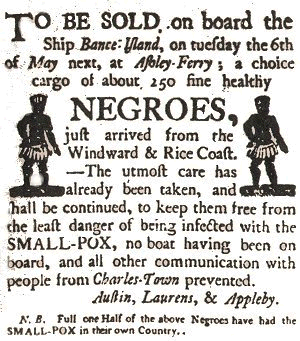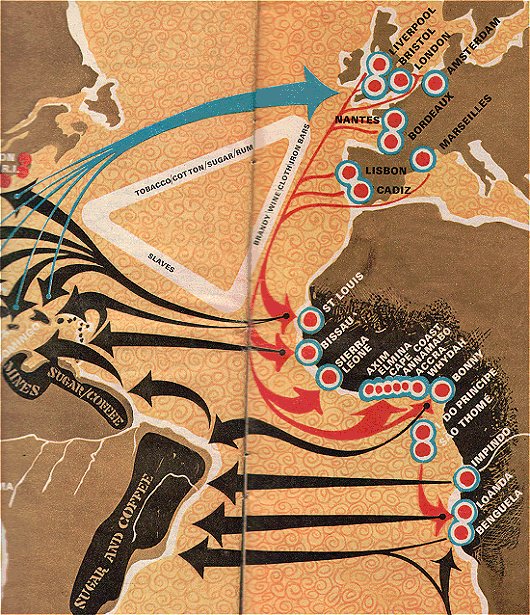
 If 'cotton was king' in the South before the Civil War, a young Yale graduate,
Eli Whitney, deserves the title of 'king-maker'. Looking for a position as tutor in Savannah, Georgia, Whitney
found the place he sought was already filled and, at the invitation of Mrs. N. Greene, spent
some time as a guest on her plantation. It was there, in 1793, that he invented the cotton gin, a
machine that made profitable the growing of short-staple cotton. ... If 'cotton was king' in the South before the Civil War, a young Yale graduate,
Eli Whitney, deserves the title of 'king-maker'. Looking for a position as tutor in Savannah, Georgia, Whitney
found the place he sought was already filled and, at the invitation of Mrs. N. Greene, spent
some time as a guest on her plantation. It was there, in 1793, that he invented the cotton gin, a
machine that made profitable the growing of short-staple cotton. ...
It was not profitable to cultivate the short-staple variety that could be grown inland because too much work was
required to separate the seeds from fibres. Whitney's cotton gin, 'gin' being short for 'engine',
made this task relatively simple. ...
When the introduction of the cotton gin made raising cotton profitable, the deamnd for cheap labor rose and
slavery became the foundation of the economy and social organization of the South. In 1860, of the total southern
population of about 12,000,000, almost 4,000,000 were slaves. ... There were about 2,000,000 slave owners,
representing about one-sixth of the population. ... Only about 1,700 families in the South were large slaveholders
with more than 100 slaves. This last group in general was the planter aristocracy that controlled southern politics
and actually had the wealth and social standing that other slave-owners and white men without slaves
aspired to.
The slaves were actually possessions. They usually could not own property, make contracts,
legally marry, control their children, testify in court, or sue their owners.
They could be punished or imprisoned at will. Imprisonment was uncommon since it prevented a slave from working,
but flogging was common. There was no such offense as assault or battery against a slave, and
laws protecting slaves against cruelty were difficult to enforce. Although slavery by its nature does invite
such cruelties, owners were partly restrained by the control of public opinion, custom, and the desire to protect
their investment. Indeed, most Negroes are said by many writers to have been generally well off physically.
Their physical living conditions may have been as good as those of workers living in slums
in the North. They worked hours no longer than those of European peasants, and after their work was
finished they had free time for amusement. Some Negroes learned such skills as blacksmithing,
and some were well educated, but most were not taught even to read or write. ...
Congress had prohibited the importation of slaves by 1808, and other countries, notably Great Britain,
outlawed the slave trade in the next few decades, but smuggling was practiced because successful plantations
were so profitable. As the price of slaves went up the illegal foreign slave trade increased,
and raising Negroes for the domestic trade became a business in itself. ...
Whitney's cotton gin in a sense was responsible for a whole way of life. While it engendered
prosperity where there might have been poverty, prosperity affected only a small proportion
of the people. Eventually the economy of the South led to a war from which it did not recover for
many decades.
From The Cultural Library, Highlights of American History, vol 6
Assignments:
1. How is the topic of slavery dealt with in this text?
2. Imagine you were a slave in the 18th century: descibe the course of a working day from dawn to dusk.
3. What do you know about today's situation of African Americans in the USA?

The Slave Triangle
This map shows the extent and the direction of the Atlantic Slave Trade, centring on the
commercial triangle, in which European ships took manufactured goods from Europe to Africa,
slaves from Africa to the Americas, bringing back sugar, coffee, cotton and other primary
commodities to Europe.
|

 If 'cotton was king' in the South before the Civil War, a young Yale graduate,
Eli Whitney, deserves the title of 'king-maker'. Looking for a position as tutor in Savannah, Georgia, Whitney
found the place he sought was already filled and, at the invitation of Mrs. N. Greene, spent
some time as a guest on her plantation. It was there, in 1793, that he invented the cotton gin, a
machine that made profitable the growing of short-staple cotton. ...
If 'cotton was king' in the South before the Civil War, a young Yale graduate,
Eli Whitney, deserves the title of 'king-maker'. Looking for a position as tutor in Savannah, Georgia, Whitney
found the place he sought was already filled and, at the invitation of Mrs. N. Greene, spent
some time as a guest on her plantation. It was there, in 1793, that he invented the cotton gin, a
machine that made profitable the growing of short-staple cotton. ...